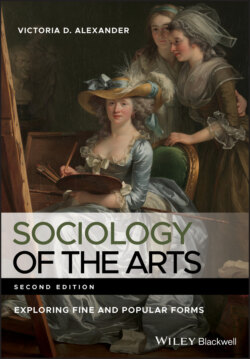Читать книгу Sociology of the Arts - Victoria D. Alexander - Страница 41
Hegemony
ОглавлениеAn important contribution to this line of thinking was made in the 1930s by Antonio Gramsci (1971), who wrote about hegemony. Hegemony is a form of cultural control. In this view, elites rule through subtle persuasion, not (for the most part) through force, as the latter engenders greater resistance. As Marx (1978 [1846]) himself wrote, “The ruling ideas are nothing more than the ideal expression of the dominant material relationships” (p. 172). But “each new class which puts itself in the place of one ruling before it, is compelled…to represent its interest as the common interest of all members of society, that is…it has to give its ideas the form of universality, and represent them as the only rational, universally valid ones” (p. 174). Hegemony embodies the norms, values, and world views foisted on society by the dominant elites. Importantly, while these hegemonic ideals reflect the interests of the dominant elites who created them, they get their power from the fact that they are widely shared and largely unquestioned by most members of the society. Hegemony controls because people buy into it and come to take it for granted.
The idea of employment is one such hegemonic idea. Most people reading this book probably either have a job already or are planning to get one, perhaps once their education is finished. We could question the idea of getting a job and contemplate living off‐grid in simple harmony with the land, hunting or growing food, weaving cloth for garments, and forgoing luxuries such as computers or flush toilets. We could question employment, but for the most part, we do not. We want to work, for a whole host of reasons, not the least of which is that we have come to see quite a number of erstwhile luxuries as necessities. The idea of employment is hegemonic; not only do we fail to question it, we actively seek it out. As Marxists point out, however, this plays into the hands of capitalists, who want a source of willing labor to exploit for their own ends.
Hegemony develops through a variety of means, but what is important for the sociology of the arts is that elites are instrumental in the creation and distribution of cultural products. They are, therefore, able to place into art ideas favorable to their own interests. To continue the example, movies, television dramas, and sitcoms portray people in occupations. That is, most of the characters have some sort of job, even though you may never see them in a work setting. We can think of exceptions, of course. Housewives are shown at home (a different hegemonic idea), the idle rich are shown idling (we envy them and work harder), and down‐and‐outs are shown in their squalor (we wish to avoid their fate). There is also a “rebel” genre where men or women take to the road to escape (which may soothe our restless fantasies). But the idea that comes across in these cultural forms is that society expects you to get a job. Both fine art and popular art can have hegemonic effects.
